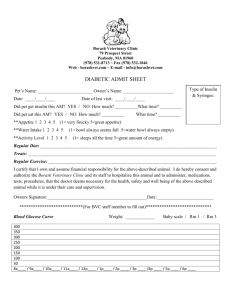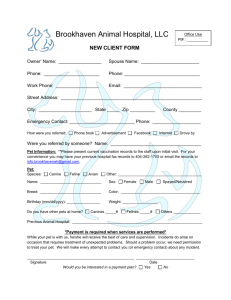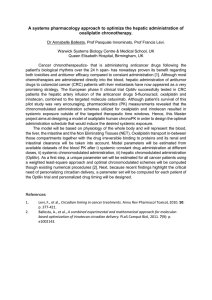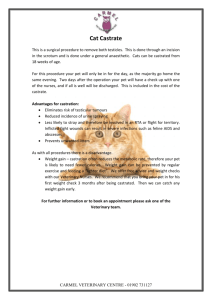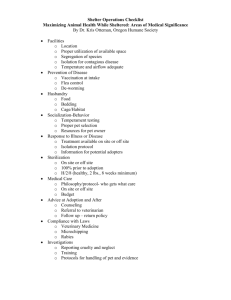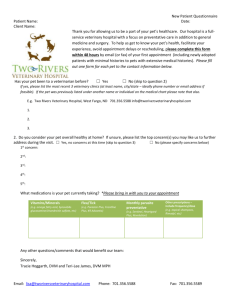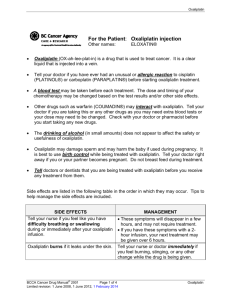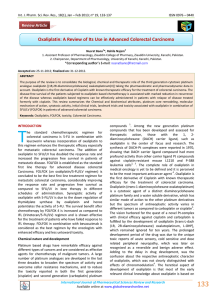You are invited participate in a research study for anti
advertisement
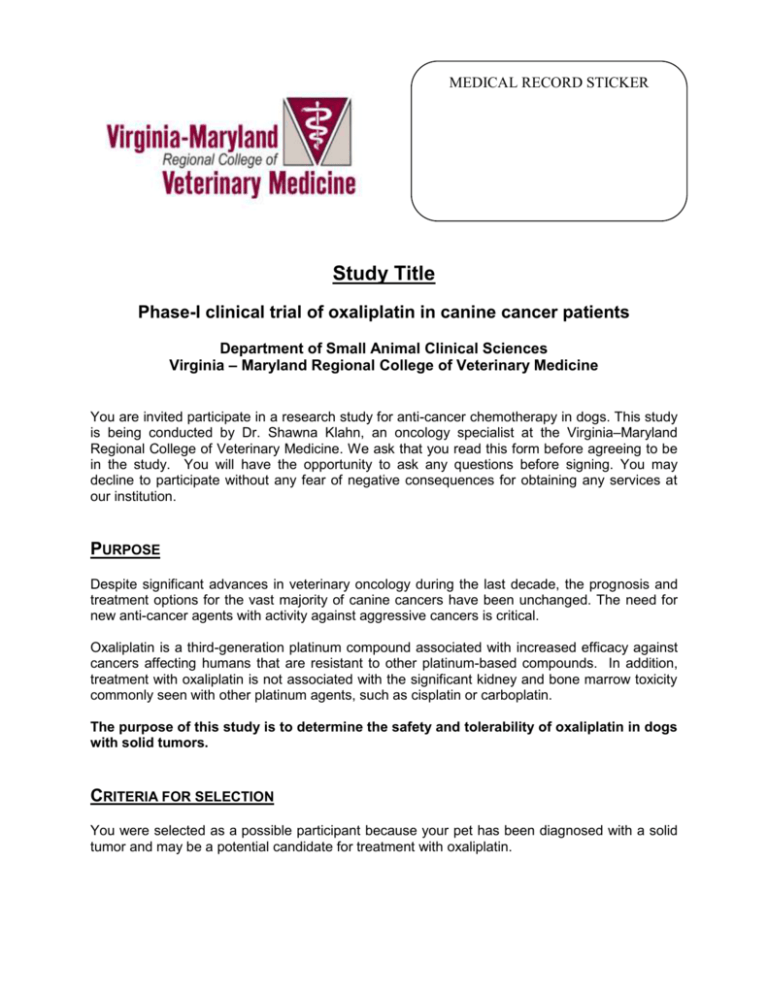
MEDICAL RECORD STICKER Study Title Phase-I clinical trial of oxaliplatin in canine cancer patients Department of Small Animal Clinical Sciences Virginia – Maryland Regional College of Veterinary Medicine You are invited participate in a research study for anti-cancer chemotherapy in dogs. This study is being conducted by Dr. Shawna Klahn, an oncology specialist at the Virginia–Maryland Regional College of Veterinary Medicine. We ask that you read this form before agreeing to be in the study. You will have the opportunity to ask any questions before signing. You may decline to participate without any fear of negative consequences for obtaining any services at our institution. PURPOSE Despite significant advances in veterinary oncology during the last decade, the prognosis and treatment options for the vast majority of canine cancers have been unchanged. The need for new anti-cancer agents with activity against aggressive cancers is critical. Oxaliplatin is a third-generation platinum compound associated with increased efficacy against cancers affecting humans that are resistant to other platinum-based compounds. In addition, treatment with oxaliplatin is not associated with the significant kidney and bone marrow toxicity commonly seen with other platinum agents, such as cisplatin or carboplatin. The purpose of this study is to determine the safety and tolerability of oxaliplatin in dogs with solid tumors. CRITERIA FOR SELECTION You were selected as a possible participant because your pet has been diagnosed with a solid tumor and may be a potential candidate for treatment with oxaliplatin. Your pet may qualify for this study if: 1. Your dog is larger than 22 lbs (10 kg) of body weight. 2. Your pet has no other serious, life-threatening illness (heart, liver, or renal failure). 3. Your pet has received no chemotherapy in the past 3 weeks, or radiation in the past 4 weeks. 4. Your pet’s renal and liver function is considered adequate based on a complete blood count and serum chemistry profile. 5. Your pet does not have significant metastatic disease that would reduce the prognosis to less than 6 weeks, if untreated. PROCEDURES If you agree to participate in this study we will perform the following procedures: Pretreatment evaluation Before beginning treatment, your pet will undergo the following: 1. Complete physical exam 2. Lab work: We will obtain blood samples from your pet for a complete blood count and chemistry profile. Four to six mls (about 1 teaspoon) of blood will be collected from a vein in your pet’s neck, which is the easiest access point. We will also collect 5 mls of urine, either through cystocentesis or free catch. These are the standard methods for obtaining blood and urine at the Veterinary Teaching Hospital. 3. Staging: We will obtain chest radiographs (3 views) and perform an abdominal ultrasound to evaluate for potential metastatic spread of the disease. If we discover any significant findings during the abdominal ultrasound, fine needle aspiration and cytology of the lesions will be attempted, as is the routine procedure in our clinic. 4. Biopsy of the tumor: A definitive diagnosis of cancer must be obtained. A tumor biopsy may be obtained under general anesthesia, following strict aseptic technique. Treatment On the day of treatment, your pet will undergo the following: 1. Pre-treatment and post-treatment medications to reduce the risk of side effects 2. Oxaliplatin treatment given intravenously 3. Blood sampling for drug metabolism analysis Pre- and Post-treatments: Medications will be given to your pet to reduce the risk of side effects that are known to be associated with oxaliplatin treatment in humans. This will include an antinausea medication (Cerenia®) subcutaneously 30 minutes before chemotherapy. Infusions of calcium and magnesium will be given intravenously 15 minutes prior to, and immediately following, treatment with oxaliplatin with continuous monitoring in the Intensive Care Unit. Treatment with calcium and magnesium on the day of treatment with oxaliplatin has been associated with decreased risk of peripheral neuropathy (sensory) side effects in humans. Oxaliplatin: Infusions will be given intravenously according to the Chemotherapy Administration and Safety Standards in the Veterinary Teaching Hospital with which all chemotherapy treatments administered to client-owned pets must comply. Oxaliplatin will be administered over a 2-hour period with continuous monitoring in the Intensive Care Unit. Anti-nausea medication will be dispensed for continued care at home. 2 FOLLOW-UP Your pet will need to return to the Veterinary Teaching Hospital once a week for 3 weeks after the treatment, as part of the follow up after the oxaliplatin treatment. At each recheck visit, your pet will have: 1. Physical exam 2. CBC, chemistry panel, ECG, and additional diagnostics if indicated We ask that you keep the clinical oncology service and investigators informed on the status of your pet’s health. You will be asked to maintain a ‘diary’ at home during the study period to record any changes in thirst, urination, stool, behavior, or other signs. RISKS The procedures performed in this study are routine clinical procedures. Treatment with oxaliplatin is experimental and not currently part of the standard treatment. Side effects that may be seen in your pet during this study may include, but are not limited to gastrointestinal, bone marrow suppression, neurological toxicity, cardiac arrhythmias, and death. Although unexpected, there could be problems with the diagnostic procedures (lab-work, staging, biopsy). These problems can be due to inflammation or infection and may result in bruising at the collection site. BENEFITS The anticipated benefit of this study is the development of a new, more effective, and safe therapy against cancer. In addition, the study will cover the initial laboratory screening (CBC, chemistry, urinalysis), the cost of the day of treatment (physical exam, ECG monitoring in ICU, the cost of the pre- and post-medications, the preparation and administration of oxaliplatin) and the cost of the scheduled follow-up visits (physical exam, CBC, chemistry, ECG). The value of these benefits is $1200. COMPENSATION Once informed consent is obtained, the study will cover the expenses for the initial lab-work (CBC, chemistry, urinalysis), the day of oxaliplatin treatment, and the scheduled follow-up visits. In addition, the study will provide a financial incentive of $50.00 for every scheduled follow-up appointment is completed on time. The compensation will be in the form of a credit to your hospital account. This compensation will only partially cover the cost all diagnostic procedures required for the diagnosis and treatment of the disease. You are responsible for any other clinical fees associated with medical complications of the oxaliplatin therapy or other medical problems. 3 PARTICIPATION IN THIS STUDY IS VOLUNTARY You will not be penalized in any way if you elect not to participate in the study. You can withdraw from the study at anytime. CONFIDENTIALITY The specific information collected about you and your animal will remain confidential. However, overall findings of the study will be published to benefit other animals and researchers, without revealing the identity of the owner or the animals. Please do not hesitate to contact the investigators or research coordinator if you have any questions. Investigator: Shawna Klahn, DVM, DACVIM (Oncology) – Phone: 540-231-4621 Clinical Trials Coordinator: Mindy Quigley – Phone: 540-231-1363 Institutional Animal Care and Use Committee: 540-231-0959 I understand the above information and agree to participate in this study. I agree to allow my pet to participate in this study including all procedures described: YES □ NO □ ________________________ Client Signature Date ________________________ Attending Veterinarian or Technician Date 4
